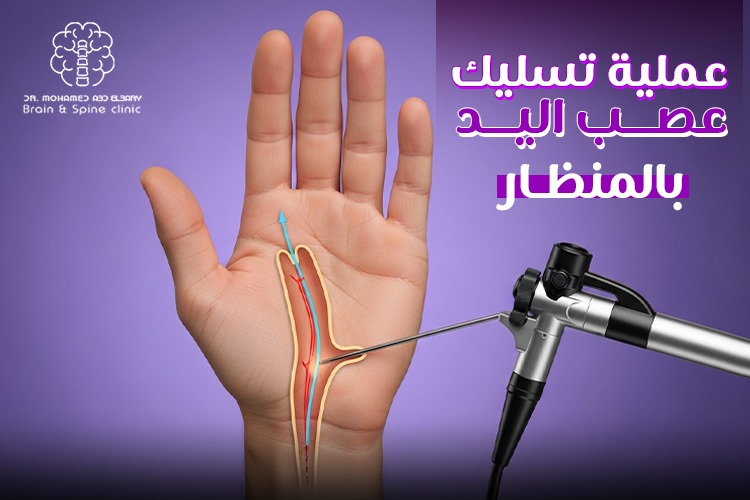
Choosing to have surgery for hand pain and numbness is a pivotal step that requires a complete understanding of all aspects.
In the context of treating Carpal Tunnel Syndrome (CTS), which stems from chronic pressure on the median nerve, nerve decompression surgery has emerged as a radical and scientifically proven solution.
Recent research and studies indicate that this procedure represents a qualitative leap in restoring vital hand functions, skillfully combining high surgical effectiveness with rapid recovery rates.
What is Endoscopic Hand Nerve Decompression Surgery?
This is a simple, minimally invasive surgical procedure that uses an endoscope (a thin tube equipped with a camera) to cut the transverse carpal ligament in the wrist.
The surgery aims to relieve pressure on the median nerve to treat symptoms of Carpal Tunnel Syndrome, such as numbness and pain in the hand and fingers.
What Research Shows About Endoscopic Hand Nerve Release
Medical research shows that the benefits of this technique go beyond just the small surgical incision; they extend to significant clinical results:
-
Less Pain and Smaller Scars: Comparative studies between open and endoscopic surgery have proven that patients who underwent endoscopic surgery suffer significantly less pain post-operation, reducing the need for painkillers.
-
The small scar in the wrist area (less than 1 cm) is also less visible, providing a better cosmetic result.
-
Faster Return to Function: According to clinical data, patients can return to using their hand for daily activities and office tasks in a much shorter period compared to open surgery.
-
This rapid recovery applies not only to light activities but also to the ability to return to work more quickly.
-
High Success Rates: Research indicates that the success rates of endoscopic hand nerve decompression surgery are very high, often reaching 90% in terms of alleviating primary symptoms like numbness, tingling, and pain, which prevents permanent nerve damage.
-
Reduced Complications: Since the procedure is performed through a small incision under the guidance of a precise camera, it lowers the risks of complications such as damage to surrounding blood vessels or nerves compared to traditional surgery.
Are You a Good Candidate for Endoscopic Surgery?
The suitability of this technique is determined by a precise assessment from a neurosurgeon, which includes a comprehensive clinical examination and a review of the nerve conduction study (EMG) results. Generally, the ideal candidate is a person suffering from Carpal Tunnel Syndrome who has not responded to conservative treatments and has no complex complications in the wrist area.
The goal of this advanced procedure is to end your suffering from pain and numbness in the safest and most effective way. Do not hesitate to consult with us to evaluate your condition and determine the most appropriate option for fully restoring your hand function.
Key Foods and Drinks That Accelerate Healing
1. Proteins: Building Fuel
Protein is the essential component for repairing damaged muscles and tissues. After surgery, the body's need for protein increases.
-
Lean Meats: Such as chicken and fish.
-
Legumes: Such as lentils, chickpeas, and beans.
-
Eggs and Dairy Products: Such as Greek yogurt.
2. Vitamins and Minerals: Immune Guardians
These elements are vital for protecting the body from inflammation and accelerating wound healing.
-
Vitamin C: Aids in collagen formation, a protein essential for wound healing. Found in fruits like oranges, strawberries, and red peppers.
-
Vitamin A: Supports tissue growth and strengthens immunity. Found in green leafy vegetables, carrots, and sweet potatoes.
-
Zinc: Speeds up wound healing and strengthens the immune system. Found in nuts, seeds, and meats.
3. Fiber: For Digestive Health
Post-surgery medications and painkillers can cause constipation. Eating fiber helps maintain a healthy digestive system.
-
Fruits and Vegetables: Such as apples, bananas, and leafy greens.
-
Whole Grains: Such as oats and brown rice.
4. Fluids: Essential Hydration
Good hydration is necessary for cleansing the body of toxins that may result from medications and helps organs function efficiently.
-
Water: The best source of hydration.
-
Natural Juices: Such as pomegranate or berry juice, which are rich in antioxidants.
Additional Tips:
-
Avoid Sugar and Processed Foods: These can cause inflammation in the body and delay the healing process.
-
Small, Frequent Meals: Eating small meals throughout the day is easier to digest and provides continuous energy for your body.
Can the Nerve Become Compressed Again After Surgery?
Yes, unfortunately, it is possible for the nerve to become compressed again after the operation, although these cases are not common.
Why Might the Nerve Narrow Again After Surgery?
After the operation, the tissue surrounding the nerve heals. In some rare cases, this healing can lead to the formation of scar tissue around the nerve. If this tissue is thick or hard, it can begin to press on the nerve again, causing symptoms like numbness and pain to return.
Factors that may increase the likelihood of this occurring include:
-
Other Medical Conditions: Diseases like rheumatoid arthritis or diabetes, which can cause tissue inflammation or affect nerve health.
-
Excessive Activity: Strenuous and excessive use of the hand during or after the recovery period may increase the chance of scar tissue formation.
-
Genetic Factors: Some people have a genetic predisposition to form more scar tissue than others.
What to Do If Symptoms Return?
If symptoms begin to return after a period of improvement, you must consult your neurosurgeon immediately. The doctor will evaluate your condition through a careful clinical examination and may request a nerve conduction study (EMG) to confirm the diagnosis.
In most cases, the return of symptoms can be managed with non-surgical treatments such as physical therapy or cortisone injections. A second nerve decompression surgery is considered a last resort after all other treatments have failed.
Always remember that regular follow-up with a doctor like Dr. Mohamed Abdel Bari and adherence to post-operative advice can significantly reduce any future risks.
In conclusion, endoscopic hand nerve decompression surgery is more than just an advanced treatment option; it represents the future of surgery, combining effectiveness, safety, and rapid recovery.
We've reviewed how this technique, with its small surgical incision and extreme precision, offers patients a radical solution to the problem of pain and numbness, significantly reducing the recovery period and enabling a quick return to normal life.
If you are suffering from Carpal Tunnel Syndrome symptoms and have not found a solution in traditional treatments, the time may be right to consider endoscopic hand nerve decompression surgery as a final option to end your suffering.
Don't hesitate to consult a specialized neurosurgeon to discuss the suitability of this technique for you.



